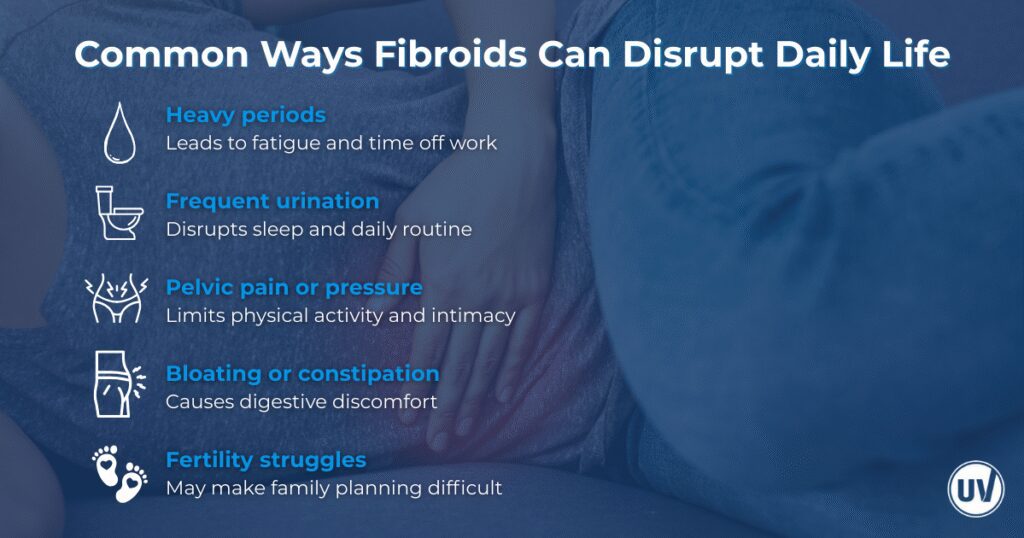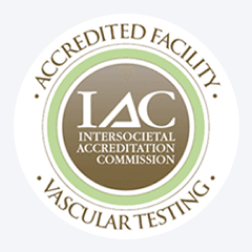Fibroids are non-cancerous tumors that grow from the smooth muscle tissue of the uterus. While fibroids are benign, they can vary greatly in size (from as small as a seed to as large as a melon) and can have a significant impact on daily life depending on their size, location, and number.
Understanding how fibroids affect your body and well-being is the first step toward managing symptoms and improving your quality of life.
What Causes Fibroids?
The exact cause of fibroids isn’t fully understood, but they are believed to result from a combination of genetic, hormonal, and environmental factors. Hormones like estrogen and progesterone, which regulate the menstrual cycle, seem to promote fibroid growth. This is why fibroids are most common during reproductive years and often shrink after menopause, when hormone levels decline.
Fibroids can also grow during pregnancy or with hormone therapies, and lifestyle factors like diet and stress may play a role in their development or progression.
Symptoms That Can Disrupt Your Daily Life
Fibroids don’t always cause symptoms, but when they do, these can interfere with your daily routine, work, and personal life.
Heavy or Prolonged Menstrual Bleeding
One of the most common and disruptive symptoms of fibroids is heavy bleeding during periods, sometimes accompanied by large clots. This can lead to anemia, leaving you feeling fatigued, weak, and unable to concentrate. Many women find themselves needing to change sanitary products frequently or feeling anxious about managing their flow in public or at work.
Pelvic Pain or Pressure
Fibroids can cause persistent pelvic pain or a sense of fullness or pressure in the lower abdomen. This discomfort can make it difficult to exercise, sit comfortably for long periods, or enjoy intimacy. In some cases, fibroids may press on other organs, leading to additional complications.
Frequent Urination
If fibroids press against the bladder, you may experience the need to urinate frequently or urgently. This can interrupt sleep and make long meetings or travel challenging.
Digestive Discomfort
Large fibroids can press on the rectum or intestines, leading to constipation, bloating, or difficulty with bowel movements.
Impact on Sexual Health
Fibroids can make intercourse uncomfortable or painful, potentially straining relationships and affecting emotional well-being.
Fibroids and Fertility
While many women with fibroids can conceive and have healthy pregnancies, fibroids can sometimes interfere with fertility. They may block the fallopian tubes, distort the shape of the uterus, or contribute to miscarriage or preterm labor. If you are trying to conceive, it is important to discuss fibroids with your healthcare provider to understand any potential impact.
How Fibroids May Affect Emotional Health
The physical symptoms of fibroids can take a toll on your emotional health. Living with chronic pain, unpredictable bleeding, or fertility challenges can lead to stress, anxiety, or depression. Seeking support—from healthcare professionals, friends, family, or support groups—can help you cope with these challenges.
Management Strategies to Improve Daily Life
Fortunately, there are a range of ways to manage fibroid symptoms and improve your quality of life.
Lifestyle and Natural Approaches
- Dietary changes: Eating a balanced diet rich in fruits, vegetables, whole grains, and lean proteins can support overall health. Some research suggests that reducing red meat and increasing green vegetables may help manage fibroid symptoms.
- Regular exercise: Staying active helps maintain a healthy weight and may help regulate hormone levels. Activities like walking, yoga, or swimming can also reduce stress and promote well-being.
- Stress reduction: Stress management techniques, such as deep breathing, meditation, or gentle movement practices, may help balance hormones and ease fibroid symptoms.
- Herbal supplements: Some women explore natural remedies, but it’s important to consult a healthcare provider before starting supplements to ensure they are safe and appropriate.

Medical Treatment Options
- Medications: Hormonal treatments, including birth control pills or gonadotropin-releasing hormone (GnRH) agonists, can help control bleeding and shrink fibroids.
- Uterine fibroid embolization (UFE): This minimally invasive procedure blocks blood flow to fibroids, causing them to shrink and relieving symptoms. UFE is an excellent option for many women who wish to avoid surgery and preserve the uterus.
- Surgery: In cases of large or symptomatic fibroids that do not respond to other treatments, options like myomectomy (removal of fibroids) or hysterectomy (removal of the uterus) may be considered.
Your provider will work with you to determine the best approach based on your symptoms, goals, and overall health.
When to Seek Expert Care
If fibroid symptoms are affecting your daily life, don’t wait to seek help. Persistent pain, heavy bleeding, fatigue, urinary frequency, or fertility concerns should all prompt a visit to a fibroid specialist. Early intervention can help prevent complications and improve your quality of life.
At United Vein & Vascular Centers, our team provides compassionate, expert care tailored to your unique needs. We offer advanced diagnostic tools and a full range of treatments, including UFE, to help you regain control of your health.
Take the First Step Toward Relief
Fibroids can have a significant impact on your daily life, but you don’t have to let them define your future. By understanding your options and working with a specialized care team, you can manage your symptoms and restore your well-being.
Ready to take charge of your fibroid health? Contact UVVC today to schedule a consultation and explore personalized treatment options.
Frequently Asked Questions
In some cases, fibroids may shrink on their own, especially after menopause when hormone levels drop. However, many fibroids persist or continue to cause symptoms that require medical attention.
You should see a doctor if you experience heavy or prolonged periods, pelvic pain or pressure, frequent urination, constipation, or difficulty becoming pregnant. These symptoms can significantly affect daily life and may indicate that treatment is needed.
Yes. Options like uterine fibroid embolization (UFE) offer a minimally invasive alternative to surgery. UFE shrinks fibroids by blocking their blood supply, helping relieve symptoms without removing the uterus.


